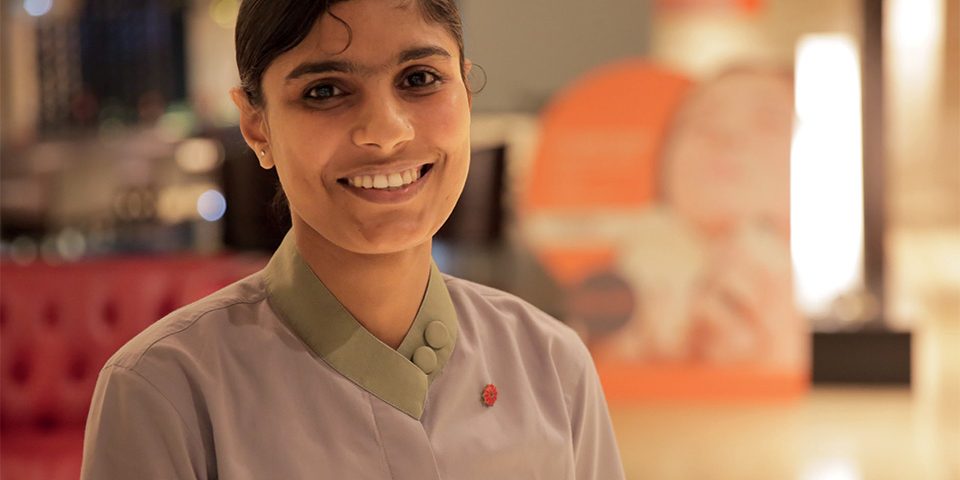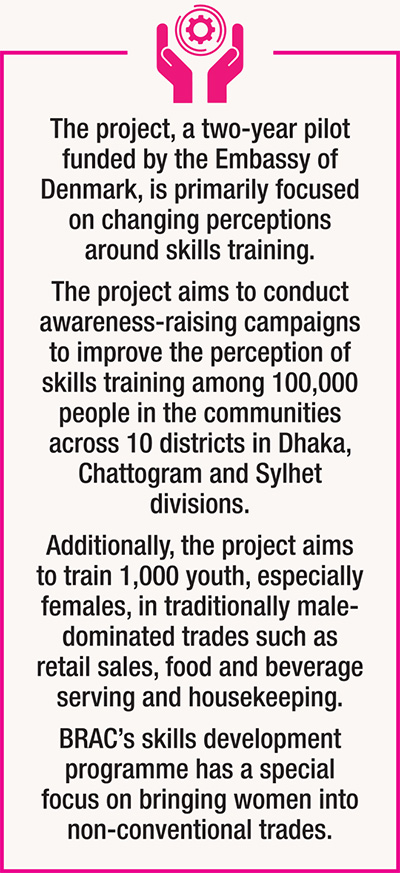Pushing the envelope, securing the paycheck

Real-life heroes: Using skills to flip the script
March 24, 2019
Putting the law to work in remote Bangladesh
March 24, 2019Pushing the envelope, securing the paycheck

Have you ever wondered why in Bangladesh we hardly ever see women working as housekeepers at hotels or resorts? Or as waitresses? Or as celebrated head chefs at swanky restaurants?
Pause for a moment.
Who makes the beds, cleans the rooms and bathrooms, sets the table and cooks the food in our homes?
The women do. Mothers, wives, daughters, sisters. And the house helps involved in these tasks are generally women too.
However, things are changing. The rise of the nuclear family, and other factors are compelling men to do their fair share in their homes.
But gender gaps persist.
The good news is that the Gender Gap Index 2017 found that Bangladesh topped the list of South Asian countries in gender equality for the third consecutive year, ranking 47th among 144 nations.
The occupational gender gap has a long way to go to reach parity.
The Global Gender Gap Report 2017 says that occupational gender gaps exist due to a myriad set of factors. Fair returns to skills and the availability of deeper talent pools are disrupted by existing gender biases.
Shirley Chisholm, the first African-American woman elected to the United States Congress, said, “If they don’t give you a seat at the table, bring a folding chair.”
The percentage of women employed in the service sector in Bangladesh was just 20.8 per cent, compared to 63.1 per cent in the agricultural sector, according to a Bangladesh Institute of Development Studies (BIDS) study referred to in a Daily Star article published in December 2017.
The report went on to say that the reason for this discrepancy came down to gendered perceptions of occupations, both by employees and employers.
Perceptions need to change.
Until they do, women like Rehana Akhter Jhuma will have to conceal their greatest achievements behind a veil of shame.
The graduate of BRAC Institute of Skills Development works as a housekeeper at Amari Dhaka, one of the most posh hotels in the capital and part of an international hotel chain.
Her employer praises her performance. But her family has no idea what she is capable of.

Jhuma explains her situation in her own words:
“I have to lie every single day. I leave home early so that I have time to change my clothes before I get to work, and I leave late so that I can change and hide my uniform. My job brings in enough money to support everyone in my family, but I cannot tell the truth about what I do to people who matter the most to me.”
Jhuma’s story exemplifies how women are pushing boundaries every day.
Her experience will resonate with many others working in occupations still considered inappropriate for women.
This is the context in which the BRAC Skills Development Programme works. And it is for this reason that the programme has been quick to advocate for the changing of perceptions about skills training and occupations.
 Unless mindsets change, the youth, and especially female learners, will forsake opportunities to improve their livelihoods.
Unless mindsets change, the youth, and especially female learners, will forsake opportunities to improve their livelihoods.
This is particularly true for trades where the economic benefits are greater but which are generally male-dominated.
Housekeeping, food and beverage service in hospitality and tourism sectors, and retail sales all offer potential for work that is not taken up.
BRAC has taken small initiatives to promote skills training across all sectors in order to improve the image of skills training and subsequent employment options. Women have been especially reached out to.
But a larger campaign is needed to promote the skills development sector if Bangladesh is to realise the full potential of its demographic dividend.
The skills development programme has recently initiated a new project dedicated solely to changing the perception of youth, the larger community and employers on skills training, especially for disadvantaged women.
This is an attempt to break stereotypes by raising awareness of relevant stakeholders in the skills development ecosystem.
The project is unique and first of its kind because although many development projects operate in the skills development space in Bangladesh, most of these focus on offering skills training and subsequent employment to youth.
Little focus is given on creating and improving the enabling environment and negative image of skills training for youth to pursue a career through technical skills training, especially for women.
The National Skills Development Policy (2011) includes conducting social marketing and awareness-raising, particularly for women, on the benefits of skills development.
The project is therefore relevant and timely in the arena of skills development. It aims to change the mindset of the young population, their families and communities, to motivate them and inform them about the benefits of skills training.
These trades offer significant financial benefits, but they come with a social cost.
Take Beauty, for example. Her colleagues at Ascott Palace Hotel, located in one of Dhaka’s upscale districts, love her for her eagerness, ambition and sincerity.
Beauty explains how the road has been hard but the personal benefits life changing:
“Although my mother is unhappy with the fact that I am working in a hotel, she knows it is a job that pays well. I also talk to people of my age now, trying to convince them that sometimes society has damaging perceptions. I love to manage my life now, investing my salary in developing myself. I joined various IT courses and I have also enrolled in a graduation course at the Open University.”
There is a dire need to intervene to change the perception of youth regarding skills training.
There is a dearth of literature assessing the reasons behind such perceptions. While there have been numerous labour market surveys to understand the skills gaps, little has been done to understand why skills development is perceived negatively.

This project aims to undertake a baseline perception study to understand the context and existing perception of skills and identify possible avenues through which skills training can be made a preferred choice for targeted youth and their families.
Upon completion of the study, planned activities will be revisited so that the interventions are aligned with the findings of the study. This approach ensures that the project interventions are designed keeping the requirements of our clients at the heart of our operations.
Because the duration of the project is two years, it will be considered to be in the piloting phase. During this phase, the long-term impact of the ideas being implemented in the field will be evaluated, in order to assess how interventions can be scaled.
There is a growing recognition of the importance of improving perceptions about skills training.
It is worth reflecting on educator Nisha Choksi’s remarks at TEDxCranbrook Schools:
“Some people believe that students go into vocational education if they’re troublemakers or low achievers, while others think that vocational education is for those individuals who don’t want to go to college or could never get in.
“And vocational education is also often thought to be the type of training that prepares individuals for manual labour, low-wage jobs, or jobs that somehow make one ‘dirty’ in some way.
“We’ve become so consumed by this notion that vocational education is not very beneficial for students that we’ve really come to disregard it. I think we need to take a second look at vocational education.”
So, let us inspire our youth to take a second look at vocational education.
Deeba Farah Haque is a senior manager of advocacy and social inclusion at BRAC Skills Development Programme.

